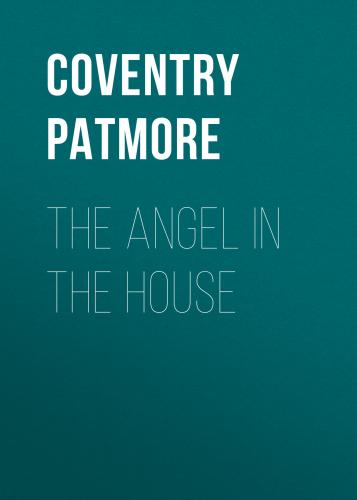The Angel in the House
Book I
THE PROLOGUE
‘Mine is no horse with wings, to gain
The region of the spheral chime;
He does but drag a rumbling wain,
Cheer’d by the coupled bells of rhyme;
And if at Fame’s bewitching note
My homely Pegasus pricks an ear,
The world’s cart-collar hugs his throat,
And he’s too wise to prance or rear.’
Thus ever answer’d Vaughan his Wife,
Who, more than he, desired his fame;
But, in his heart, his thoughts were rife
How for her sake to earn a name.
With bays poetic three times crown’d,
And other college honours won,
He, if he chose, might be renown’d,
He had but little doubt, she none;
And in a loftier phrase he talk’d
With her, upon their Wedding-Day,
(The eighth), while through the fields they walk’d,
Their children shouting by the way.
‘Not careless of the gift of song,
Nor out of love with noble fame,
I, meditating much and long
What I should sing, how win a name,
Considering well what theme unsung,
What reason worth the cost of rhyme,
Remains to loose the poet’s tongue
In these last days, the dregs of time,
Learn that to me, though born so late,
There does, beyond desert, befall
(May my great fortune make me great!)
The first of themes, sung last of all.
In green and undiscover’d ground,
Yet near where many others sing,
I have the very well-head found
Whence gushes the Pierian Spring.’
Then she: ‘What is it, Dear? The Life
Of Arthur, or Jerusalem’s Fall?’
‘Neither: your gentle self, my Wife,
And love, that grows from one to all.
And if I faithfully proclaim
Of these the exceeding worthiness,
Surely the sweetest wreath of Fame
Shall, to your hope, my brows caress;
And if, by virtue of my choice
Of this, the most heart-touching theme
That ever tuned a poet’s voice,
I live, as I am bold to dream,
To be delight to many days,
And into silence only cease
When those are still, who shared their bays
With Laura and with Beatrice,
Imagine, Love, how learned men
Will deep-conceiv’d devices find,
Beyond my purpose and my ken,
An ancient bard of simple mind.
You, Sweet, his Mistress, Wife, and Muse,
Were you for mortal woman meant?
Your praises give a hundred clues
To mythological intent!
And, severing thus the truth from trope,
In you the Commentators see
Outlines occult of abstract scope,
A future for philosophy!
Your arm’s on mine! these are the meads
In which we pass our living days;
There Avon runs, now hid with reeds,
Now brightly brimming pebbly bays;
Those are our children’s songs that come
With bells and bleatings of the sheep;
And there, in yonder English home,
We thrive on mortal food and sleep!’
She laugh’d. How proud she always was
To feel how proud he was of her!
But he had grown distraught, because
The Muse’s mood began to stir.
His purpose with performance crown’d,
He to his well-pleased Wife rehears’d,
When next their Wedding-Day came round,
His leisure’s labour, ‘Book the First.’
CANTO I
The Cathedral Close
PRELUDES
Lo, love’s obey’d by all. ’Tis right
That all should know what they obey,
Lest erring conscience damp delight,
And folly laugh our joys away.
Thou Primal Love, who grantest wings
And voices to the woodland birds,
Grant me the power of saying things
Too simple and too sweet for words!
I walk, I trust, with open eyes;
I’ve travell’d half my worldly course;
And in the way behind me lies
Much vanity and some remorse;
I’ve lived to feel how pride may part
Spirits, tho’ match’d like hand and glove;
I’ve blush’d for love’s abode, the heart;
But have not disbelieved in love;
Nor unto love, sole mortal thing
Of worth immortal, done the wrong
To count it, with the rest that sing,
Unworthy of a serious song;
And love is my reward; for now,
When most of dead’ning time complain,
The myrtle blooms upon my brow,
Its odour quickens all my brain.
The richest realm of all the earth
Is counted still a heathen land:
Lo, I, like Joshua, now go forth
To give it into Israel’s hand.
I will not hearken blame or praise;
For so should I dishonour do
To that sweet Power by which these Lays
Alone are lovely, good, and true;
Nor
